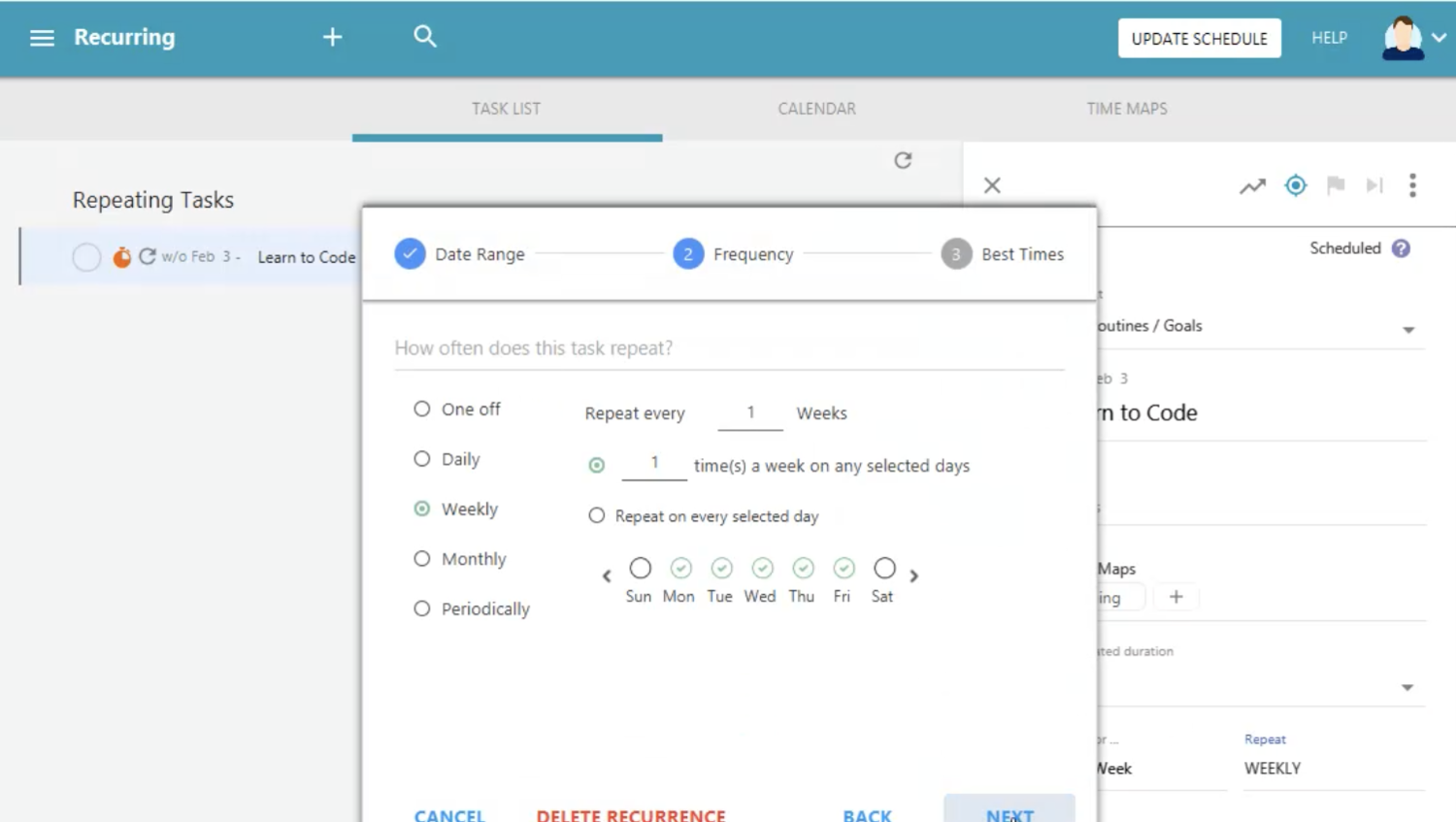
Time is a valuable resource, and none of us have enough of it in a day. If you have a busy schedule, it can be incredibly overwhelming juggling everything that needs your time and energy.
A wild 89% of people never finish their to-do list. By finding ways to use our time more efficiently, we can get to the end of our to-do lists and free our time for our real goals in life.
After a lifetime of experimenting with productivity hacks and tips, I’ve compiled what I’ve learned.
Below you will find eight tips to help you have a productive day so you can focus on what is important to you.
1. Manage Your To-Do List, Don’t Let it Manage You
Sometimes a productive day feels impossible because we just don’t know where to start. In these situations, the most simple solution is to find out how long each task will take.
Take out whatever you use for a to-do list. Maybe it’s on your phone or in a bullet journal? Maybe you have one for work or school and one for home?
Most look something like this:
- Groceries
- Press release
- Blog post
- Hair cut
See the problem? Here I have four things to do today and I have no idea how long they will take, or if I can even fit them in the day!
A better list would look like:
- Groceries
- Meal plan (.5 hour)
- Look for grocery deals (.5 hour)
- Shop (1 hour)
- Press release
- Research (.5 hour)
- Write (1 hour)
- Edit (.5 hour)
Great. Now we can actually find time to schedule these tasks throughout our day and prioritize what deserves more of our time today.
2. Always Be Early and Have a Buffer

Ok, to be completely honest I also struggle with this.
But being early is the best way to avoid pitfalls that can ruin a productive day. If you arrive to work 10 minutes late and there’s an urgent email in your inbox, any time you hoped to spend on reviewing your to-do list and planning your day is ruined. And maybe right under that email was an equally urgent email that you weren’t able to prioritize.
Find out ahead of time how long it takes to get where you are going to and then leave 15 minutes to start with.
Along the same lines, try and build in a buffer for everything you do. Buffers help in case a task takes longer than you thought it might. This also helps you prepare yourself instead of flying by the seat of your pants. Do you have an important meeting at 2pm? Build in a buffer of 15 minutes before to prepare your notes and 15 minutes after to organize your notes.
3. Block Out Your Time

Blocking out your time is a lot like scheduling a meeting with yourself. We already do this naturally. The time on the bus in the morning is when you get caught up on the news, or Saturday mornings are when you clean the house.
Blocking out time is a proven way to eliminate distractions and have a more productive day.
Each task on your to-do list should come with a time block.
Using the same example from above, I should schedule time on my calendar between 1 – 1:30pm to research before I start writing a press release. This helps in a few different ways, if I get an email about something that can wait a half hour during this time period, I know I don’t have to jump and respond right away.
SkedPal is a useful app that will take your to-do list, run it through some fancy algorithms and schedule them for you.
If you have time set aside to get your items done, you will be able to be more productive without being overwhelmed.
4. Set Boundaries With a Time Map
How many hours do you have in a day to give to work, school, home, or yourself? There is a dangerous culture of long working hours and burnout in our society and in the end it hurts us all. When you are looking at your to-do list for work, how many hours in the day are you setting aside for work? A traditional 8 hours? Maybe 10? Maybe more?
Our time is a limited resource, and it needs to be budgeted as such. A time map carves out time for each area of your life to help you determine the amount you can get done in each area.
You need to decide for yourself what your time map looks like. How many hours in a day are for work, and how many are for the other things in your life?
Time mapping your working and home hours will also help you say no. If a request comes in to draft a new proposal for a client, but there aren’t enough “work” hours in the day? Too bad! It will either have to wait for tomorrow or someone else will have to do it.
Time mapping should apply to your home and personal tasks too. Running a home and family is a full-time job and it takes skill, time, and labor.
Schedule the laundry, paying the bills, and other home items that take up your time the same way you would with work to-do’s and schedule time to do them. Maybe you have some time before dinner, or an hour before your favorite show? Many of us will only have an hour or two after the work day to get our home tasks done, but without mapping out that time and scheduling the tasks we have, they can start to pile up.
5. Be like Bill Gates and Automate What You Can

Why do you want to be more productive? What can you gain from having more time in the day? These are the important questions to ask yourself because they can also help you find out what you’re spending your time on that isn’t beneficial.
When people say “we all have the same hours in the day as Bill Gates”, that’s not exactly true.
Bill Gates (I’d imagine) employs people to clean his home, a dishwasher to do the dishes, a barber that will make house calls, a chef to prepare his food and order his groceries, a personal assistant (or two) to schedule his meetings and plan out his day.
These are all tasks that take skill, time, and labor, that’s why people who we employ to take on these tasks deserve to be fairly compensated.
If I were Bill Gates, I’d love to employ people to do all this for me, but instead I have to do it myself or get creative.
For example, I live in the city with no grocery stores nearby. This means that meal planning, making a grocery list, walking to the store, actually doing the groceries (and fighting through the crowds to do it), and getting all the groceries home and put away, can sometimes take up an entire day of my weekend.
Some people love grocery shopping and good on you for that. I HATE it. That whole process wastes a day of my weekend that I’d rather use hanging out with my friends or binge watching TV – I’m not afraid to admit it!
So grocery shopping became something to automate. I use Amazon Prime Fresh to find 2-weeks worth of meals that fit my budget, and then I have it delivered every 2-weeks before 7am. Voila, my fridge is full and I only spent an hour every two weeks.
What is your “grocery shopping”? Find creative ways to automate it to rescue your time.
6. Schedule a Weekly Review With Yourself
I’ve written before about how much I love the GTD system.
One of the reasons is the weekly review, time you set aside every week to review all your to-dos, goals, and make sure everything is scheduled and on-track.
This includes far-off not urgent goals like “Learn More About Ancient Rome”, it’s never going to get off your to-do list if you don’t schedule some time to do some googling and check-in every week to see if you completed it or need to reschedule.
We spend so much energy doing all the things, this is a check-in with yourself to make sure the right things are getting done and your goals are being reached.
7. Turn it off

Productivity isn’t a 24/7 thing. Don’t let anyone tell you otherwise.
After a productive day or week, take some time to be lazy. This goes back to setting boundaries. There are only so many hours that even the most successful person can have their productivity switch turned on everyday.
Being lazy can be as important to your brain’s health as sleep. Don’t spend every waking hour of your day doing “something” and instead find some time to do “nothing”.
Once your productive hours are over for the day, it’s time to stop and do whatever you want.
That’s what productivity is about anyways, making more time to get things done so you can get back to your life and do the things you enjoy doing.
8. Don’t Hold Yourself to Unattainable Standards
We judge ourselves too much on our productivity. People who work late hours and have multiple side hustles are seen as aspirational. Americans are stressed out, overwhelmed, and totally exhausted. Also, many of us have to work this hard in order to make ends meet.
But at the end of the day, our personal value doesn’t come from how productive at work we are, so if you slip up and end up spending too much time on a project you love or forget to do the dishes one night, most likely the world is not about to end.
You will never get everything done if you’re always blaming yourself for not living up to an unattainable standard.
Productivity hacks are a great way to find out how to have a productive day, so that we can reclaim our time for ourselves, not for more to-dos!
Be productive and work hard when you have to, but make time to value your own time.
This article was originally posted on Kind North, a lifestyle website for professional millennial women.

